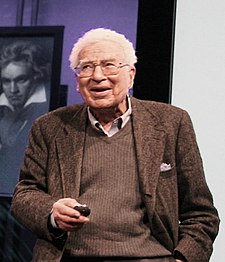A MoneyLaw move by Murray Gell-Mann
 Physicist Murray Gell-Mann, along with George Zweig, predicted the existence of quarks. For this feat Gell-Mann won the Nobel Prize in Physics. He also demonstrated his affinity for literature by drawing the name quarks from a passage in Finnegans Wake: "Three quarks for Muster Mark!" Physicist Murray Gell-Mann, along with George Zweig, predicted the existence of quarks. For this feat Gell-Mann won the Nobel Prize in Physics. He also demonstrated his affinity for literature by drawing the name quarks from a passage in Finnegans Wake: "Three quarks for Muster Mark!"A Jurisdynamics post describes how Gell-Mann's autobiographical and lyrical book, The Quark and the Jaguar: Adventures in the Simple and the Complex, spans this broader weblog network's subjects of interest. Gell-Mann does propose at least one intriguing change in academic culture, which I commend to MoneyLaw's readership: If I may be so presumptuous as to rephrase the wisdom of a Nobel laureate in a genuine discipline: Humanity will be much better off when academia is governed according to its proper and legitimate purpose — the advancement of knowledge and its propagation to students and to society at large. |


 We must attach a higher prestige to that very creative act, the writing of serious review articles and books that distinguish the reliable from the unreliable and systematize and encapsulate, in the form of reasonably successful theories and other schemata, what does seem reliable. If an academic publishes a novel research result at the frontier of knowledge . . . , he or she may reap a reward in the form of a professorship or a promotion, even if the result is later shown to be entirely wrong. However, clarifying the meaning of what has already been done (or picking out what is worth learning from what is not) is much less likely to advance an academic career. Humanity will be much better off when the reward structure is altered so that selection pressures on careers favor the sorting out of information as well as its acquisition.
We must attach a higher prestige to that very creative act, the writing of serious review articles and books that distinguish the reliable from the unreliable and systematize and encapsulate, in the form of reasonably successful theories and other schemata, what does seem reliable. If an academic publishes a novel research result at the frontier of knowledge . . . , he or she may reap a reward in the form of a professorship or a promotion, even if the result is later shown to be entirely wrong. However, clarifying the meaning of what has already been done (or picking out what is worth learning from what is not) is much less likely to advance an academic career. Humanity will be much better off when the reward structure is altered so that selection pressures on careers favor the sorting out of information as well as its acquisition.










0 Comments:
Post a Comment
<< Home